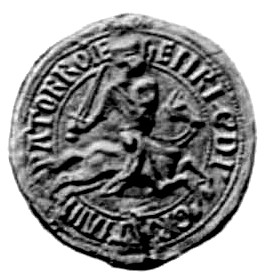Henry of Flanders facts for kids
Quick facts for kids Henry of Flanders |
|
|---|---|
| Emperor and Autocrat of the Romans | |

Seal of Henry of Flanders
|
|
| Latin Emperor of Constantinople | |
| Reign | 1205–1216 |
| Coronation | 20 August 1206 |
| Predecessor | Baldwin I |
| Successor | Peter |
| Born | c. 1176 Valenciennes |
| Died | 11 June 1216 Thessaloniki |
| Spouse | Agnes of Montferrat Maria of Bulgaria |
| House | House of Flanders |
| Father | Baldwin V, Count of Hainaut |
| Mother | Margaret I, Countess of Flanders |
Henry of Flanders (born around 1178 – died June 11, 1216) was an important leader during the Fourth Crusade. He later became the Latin emperor of Constantinople. He ruled from 1205 until his death in 1216. The Fourth Crusade led to the capture of the Byzantine Empire and the creation of the Latin Empire.
Life of Henry
Henry was born in Valenciennes, France, around the year 1178. His father was Count Baldwin V of Hainaut. His mother was Countess Margaret I of Flanders.
Henry married Agnes of Montferrat in 1204. She was the daughter of Boniface of Montferrat. Later, in 1213, Henry married Maria. She was the daughter of the Bulgarian ruler Kaloyan. This marriage helped create peace with the Bulgarians.
Henry's Role in the Fourth Crusade
Henry joined the Fourth Crusade around 1201. He showed great bravery and skill during the siege of Constantinople of 1203. He was one of the main generals leading the crusader forces.
During the 1203 siege, Henry commanded one of the eight divisions. Other famous leaders included Boniface of Montferrat and Enrico Dandolo. Henry's own brother, Baldwin IX of Flanders, led the largest group.
In 1204, Henry led a daring mission to find supplies. He raided a castle near the Black Sea. The Byzantine Emperor Alexius V Ducas tried to ambush him. But Henry and his knights bravely defeated the Greek forces. He returned to the crusader camp with valuable items. Henry quickly became a respected leader in the new Latin Empire.
Ruling the Latin Empire
Henry's older brother, Emperor Baldwin, was captured in 1205. This happened during the Battle of Adrianople against the Bulgarians. Henry was chosen to rule the empire temporarily. When news of Baldwin's death arrived, Henry became the new emperor. He was crowned on August 20, 1206.
When Henry became emperor, some nobles in the Kingdom of Thessalonica refused to accept him. This led to a two-year war. Henry defeated these nobles and took control of their castles.
Henry was known as a wise and fair ruler. He spent much of his reign fighting against Tsar Kaloyan of Bulgaria. He also fought against Emperor Theodore I Lascaris of Nicaea. Henry later defeated Boril of Bulgaria in the Battle of Philippopolis.
He also expanded the Latin Empire's lands in Asia Minor. He made a truce with Theodore I in 1214. This agreement helped divide the lands fairly between the Latin and Nicean empires.
Henry treated the local Greek people with respect. A Greek historian from that time, George Akropolites, wrote about Henry's kindness. Henry included many Greeks in his government and army. He treated common people as his own. When a church leader tried to close Orthodox churches, Henry stopped him. He listened to the Greek clergy and protected their churches.
Henry was brave and tolerant. He was not cruel or weak. He even stood up to powerful church leaders when he thought they were wrong. Henry died on June 11, 1216. After his death, his brother-in-law Peter Courtenay became emperor. However, Peter never reached Constantinople. Henry's sister, Yolanda, ruled the empire for a few years.
|
Henry of Flanders
House of Hainaut
Born: c. 1176 Died: 11 June 1216 |
||
| Regnal titles | ||
|---|---|---|
| Preceded by Baldwin I |
Latin Emperor of Constantinople 1206–1216 |
Succeeded by Peter |
See also
 In Spanish: Enrique de Flandes para niños
In Spanish: Enrique de Flandes para niños
 | Stephanie Wilson |
 | Charles Bolden |
 | Ronald McNair |
 | Frederick D. Gregory |

